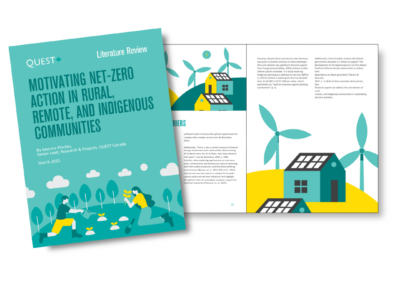The Best Laid Plans

Although she has trouble pinning down a single event that led to the City of Halifax having one of the most progressive government climate plans in Canada, Shannon Miedema does recall the autumn of 2018. The Intergovernmental Panel on Climate Change had just released its Special Report on Global Warming of 1.5ºC, warning of the dire consequences of ignoring climate change.
“Some of the really scary stuff, it stirred people,” Midedema says.
The report inspired Halifax City Councillor Richard Zurawski to propose that the municipality declare a climate emergency in January 2019. When it did, Council asked staff for a new climate plan.
That summer, the IPCC report seemed prophetic in this port city when Hurricane Dorian struck, ripping roofs off buildings and knocking ancient trees atop cars. It even toppled a massive downtown crane, which wrapped itself around the Trillium, an under-construction condominium building. Weeks later, Swedish teen activist Greta Thunberg inspired youth around the world, including Halifax, to abandon class in a global climate strike.
Miedema had spent a career in public service waiting for such a shift in public perception, for some real momentum on climate change. Local business leaders started approaching her, wanting to be part of a solution, wanting her employer, the Halifax Regional Municipality, to take firm leadership on climate change.
In her role as manager of Halifax’s Energy & Environment Program, Miedema had been overseeing the integration of the city’s greenhouse gas reduction and community energy plans. Council’s request for a new plan gave them less than a year to build close working relationships with more than 250 government departments, utilities, non-profits, academics, businesses, Mi’kmaq communities, African Nova Scotian communities, Acadian groups and young people.
Miedema and her team knew that Halifax, as a municipal government, had to mobilize individuals and institutions across the city to make any real impact against climate change. That’s because the municipality is directly responsible for a very small portion of the emissions created from within its borders, including from its fleet of vehicles and building-related emissions.
Despite the time crunch, they succeeded, readying an ambitious, comprehensive plan, HalifACT 2050, to present Council for March 2020.
Then COVID-19 hit.
Financial Uncertainty
By April, the Energy & Environment team was deeply worried. Council wasn’t meeting in person, and the plan still hadn’t been presented. Municipal governments were concerned about losing revenue streams, like property taxes and transit fees. An election loomed in October.
Would Council be willing to publicly commit to a significant investment in infrastructure and new staffing needs? “We didn’t even know if we had job security,” Miedema recalls.
Her team had seen it before: when the economy takes a hit, the environment takes a backseat. Time was of the essence; the science says humanity has ten years to reduce emissions by 75 percent, or we’ll exceed the 1.5 degree C threshold. That would expose hundreds of millions more people to water scarcity, while in this part of the world we could suffer from extreme precipitation, flooding and runoff.
But Halifax Mayor Mike Savage and City Council refused to let the matter drop. They requested that the climate plan be presented, COVID or no COVID.
Miedema was nervous their plan would be seen as too aggressive. It aimed to make city operations carbon neutral by 2030, retrofit all existing buildings by 2040, make all new vehicle sales electric by 2030, vastly expand public transit, active-transportation corridors and greenspaces, and nearly eliminate all greenhouse gas emissions in the city by 2050.
That kind of reduction would require substantial commitments from many partners, with HRM making real financial commitments in a time of looming economic crisis. That’s why Midema’s team emphasized that HalifACT 2050 is as much an economic plan as it is a climate plan. The investments in energy efficiency, district energy systems and large solar and wind installations will generate 170,000 person-years of employment, and save $22 billion over the life of the plan.
And, as thousands of online visitors and survey respondents said, “Now is the time for action … we can’t wait.”
Council did have the option of approving the plan without committing any immediate resources due to COVID. But instead, they requested budget specifics for the next two years. Three new climate-related jobs are now being posted.
“Now the financial department knows Council is serious about this,” Miedema says.
The Strategic Plan is Dead; Long Live the Strategic Plan
With HalifACT 2050 passed, the general feeling at Energy & Environment became, “let’s celebrate; now what’s next?”
They entered, along with many of their most important stakeholders—including the Halifax Partnership and Nova Scotia Power—the Gigatonne Program, and e-met weekly with a UK consultant, whose motto was “Death to the strategic plan!” The irony wasn’t lost on the team.
The idea is that administrators need to take risks, try out ideas without fear of failure and grow the programs that work. They were challenged to come up with ideas to cut a tonne of greenhouse gas emissions in a month—a tiny amount compared to Halifax’s 30-year goals. But if the idea works, you scale it up.
Halifax worked again with its stakeholders to create an ebike delivery program to combat emissions from all the new COVID-19 deliveries. It tested their ability to deliver a program quickly, working with other institutions, while also giving them practice for some upcoming larger initiatives, like a strategy for supplying recharging facilities for electric vehicles. “We’re also working on a retrofit plan for our 300 municipal buildings,” Miedema says. “When we do scheduled maintenance, we can now work with operations to check the insulation and energy production.”
Having rallied the climate change troops, she’s now noticing a change in procedure at HRM, with staff from other departments consulting her about reports she didn’t know existed, seeking a climate change perspective. The city looks at every policy through a series of lenses: equity and inclusion, public safety, gender, and now climate.
Halifax has arguably the best climate plan in Canada. Now, by working across departments and putting a climate lens on everything, they hope to also lead the way in action, creating a better, more livable city in the process.
“Halifax will become much more diverse in mobility and transportation,” Miedema says. “With more resilient, equitable, inclusive communities. A place where residents feel heard.”
So, the strategic plan is not quite dead.” Perhaps, if anything, it’s become livelier.
ABOUT THE AUTHOR

Chris Benjamin
Chris Benjamin is a journalist, editor and author. His book Eco-Innovators: Sustainability in Atlantic Canada, won the Best Atlantic-Published Book Award and was a finalist for the Evelyn Richardson Non-Fiction Award.

About Powered by Communities
Established in 2017, Powered by Communities is an awareness-raising, communications and media platform that highlights and celebrates local community energy initiatives taking place across the country, from coast to coast to coast. The platform inspires, informs and engages its readership with stories and articles detailing community energy initiatives being led by local governments, municipalities, Indigenous communities, community groups, non-profits, charities, and enterprising individuals.

À propos de QUEST Canada
QUEST Canada est un organisme national à but non lucratif qui soutient les collectivités canadiennes dans leur cheminement vers la consommation nette zéro. Depuis 2007, nous facilitons les connexions, donnons du pouvoir aux champions communautaires et influençons les décideurs pour mettre en œuvre des systèmes énergétiques efficaces et intégrés qui répondent le mieux aux besoins des communautés et maximisent les opportunités locales. Nous développons des outils et des ressources, nous réunissons les parties prenantes et les détenteurs de droits et nous conseillons les décideurs - tout cela dans le but d'encourager et de permettre aux communautés de contribuer aux objectifs de consommation nette zéro du Canada. Pour en savoir plus sur QUEST Canada, visitez notre site Web : www.questcanada.org.

Support local communities by sharing this story
MORE FROM POWERED BY COMMUNITIES
S'inscrire
Rejoindre la conversation!
Inscrivez-vous pour recevoir les dernières nouvelles et mises à jour sur les événements de QUEST Canada et recevez la newsletter mensuelle de QUEST Canada.




